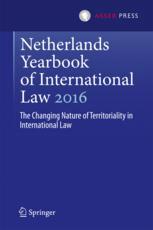

Most ebook files are in PDF format, so you can easily read them using various software such as Foxit Reader or directly on the Google Chrome browser.
Some ebook files are released by publishers in other formats such as .awz, .mobi, .epub, .fb2, etc. You may need to install specific software to read these formats on mobile/PC, such as Calibre.
Please read the tutorial at this link. https://ebooknice.com/page/post?id=faq
We offer FREE conversion to the popular formats you request; however, this may take some time. Therefore, right after payment, please email us, and we will try to provide the service as quickly as possible.
For some exceptional file formats or broken links (if any), please refrain from opening any disputes. Instead, email us first, and we will try to assist within a maximum of 6 hours.
EbookNice Team

Status:
Available4.4
8 reviewsInternational law holds a paradoxical position with territory. Most rules of international law are traditionally based on the notion of State territory, and territoriality still significantly shapes our contemporary legal system. At the same time, new developments have challenged territory as the main organising principle in international relations. Three trends in particular have affected the role of territoriality in international law: the move towards functional regimes, the rise of cosmopolitan projects claiming to transgress state boundaries, and the development of technologies resulting in the need to address intangible, non-territorial, phenomena. Yet, notwithstanding some profound changes, it remains impossible to think of international law without a territorial locus. If international law is undergoing changes, this implies a reconfiguration of territory, but not a move beyond it.
The Netherlands Yearbook of International Law was first published in 1970. It offers a forum for the publication of scholarly articles of a conceptual nature in a varying thematic area of public international law.